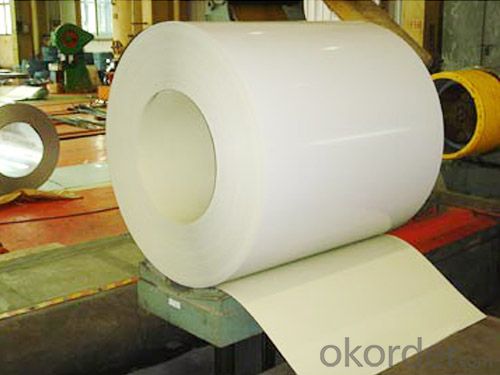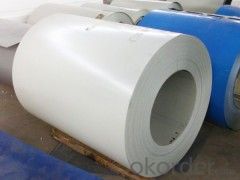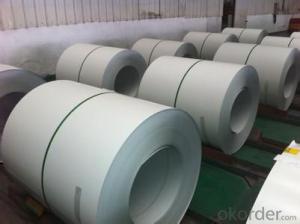Pre-painted Galvanized/Aluzinc Steel Sheet Coil with Prime Quality and Lowest Price
- Loading Port:
- Shanghai
- Payment Terms:
- TT OR LC
- Min Order Qty:
- 100 m.t.
- Supply Capability:
- 10000 m.t./month
OKorder Service Pledge
OKorder Financial Service
You Might Also Like
1.Structure of Pre-painted Galvanized/Aluzinc Steel Coil Description
With GI (aluzinc) as base metal, after pretreatment (degrease and chemical treatment) and liquid dope with several layers of color, then after firing and cooling, finally the plate steel is called pre-painted galvanized (aluzinc) steel.
2.Main Features of the Pre-painted Galvanized/Aluzinc Steel Coil
• Capability of decoration, molding, corrosion resistance
• Workability, durability
• Excellent heat resistance performance
• High strength
• Good formability
• Good visual effect
3.Pre-painted Galvanized/Aluzinc Steel Coil Images


4.Pre-painted Galvanized/Aluzinc Steel Coil Specification
Thickness : 0.14-1.20 mm
Width : 914mm, 1000mm, 1220mm and 1250mm, thickness 600-1250mm is available
Quality standar: JIS G3312 CGCC & CGLCC
Hardness of P: Both soft and hard quality are available
Surface finish: with or without protect film
Finish by coil or sheet: Both sheet and coil are available
8Zinc coating: 60-275G/M2, both sides
Paint thickness for top side : 5 micron primer + (10-20) microns modified polyester, any RAL color code.
Paint thickness for back side: (5-10) microns Epoxy
Weight per coil: 4-6 tons, also can be upon customer's requirements.
Max loading weight in one 20ft container : 25 tons generally
5. FAQ of Pre-painted Galvanized/Aluzinc Steel Coil
We have organized several common questions for our clients,may help you sincerely:
1. What is the minimum order quantity ?
Our MOQ is 50mt for each size. And we will consider to give more discount if you make big order like 1000 tons and more. Further more, the more appropriate payment term your offer the better price we can provide.
2. How long can we receive the product after purchase?
Usually within thirty working days after receiving buyer’s advance payment or LC. We will arrange the factory manufacturing as soon as possible. The cargo readiness usually takes 15-25 days, but the shipment will depend on the vessel situation.
- Q:Steel used to be made in the #92;Bessemer Converter, write about how steel making processes today produce better quality steel????
- Steel making today is a faster process as use Blast furnace which Coke Limestone Iron ore are fed into the top of the furnace. after these are fed in a exothermic happens and converts these ores into Iron. Iron is not strong enough to be used in thing this is formally known as pig iron. To convert Iron ore into steel it has to go to a process called the BOS Basic Oxygen Steel-making were oxygen is blown onto the iron ore for about 30 to 45 min and this then turns it into steel as all the impurities are taken out and this floats on top and known as slag and used for things such as road building. Once you have steel this is then pored into ladles and taken to the continuous caster and rolled into slabs, billets and bars and then cut off and rolled into a finished products and then taken to compniaes to be made into thins you see made out off metal such as skyscrapers. Hope this helps :o)
- Q:How are steel coils inspected for surface defects?
- Steel coils are inspected for surface defects using various methods such as visual inspection, magnetic particle testing, eddy current testing, and ultrasonic testing. These techniques help identify any imperfections or flaws on the surface of the steel coils, ensuring they meet quality standards before they are further processed or shipped to customers.
- Q:case hardening steel is adviced or thru hardening steel is most suitable?
- I don't know your application, but here is some advice. Case hard provides a hard shell around soft steel, depending on the bake, the case is usually .002-.008 thick. (thousands of an inch) Heat treated steel or tool steel is hard all the way thru. Case hardening, provides toughness with flexibility, however, once it's compromised, the part is scrap. Hardend tool steel is extreemly hard throughout and the harder it is, the more brittle it becomes. The application of the part will help you to determine the material needed. For instance; Plastic injection molds are very hard so the hot plastic wont erode them over years of use. Punch Press dies aren't as hard but are tougher to withstand the shock. Machine bolts are case hardened so they can last, but soft enough to allow some stretching during tightening. Either way, the time in mfg will be about the same. Most tool steels today cut like cheese, but take time to be heat treated. Tool steel will cost a bit more than low carbon steel. Low carbon steel is as machinable, and cheaper, but, again, the baking period is as long or longer than tool steel. There are a lot of materials on the market today that maintain the durability of heatreated steel without having to go thru that process. 4140, ( or chrome/moly) comes to mind. There are also some 400 series stainless that work as well, and others. You need to determine strength, flexibility, ease of mfg, cost and repairability when considering which steel to use.
- Q:I bought this Brinks pad lock and it says boron steel on the lock. I was just wondering what exactly is boron steel and how hard/tough is it?
- Boron steel is rather hard, it is by no means titanium, but certainly better than mild steel. However, as with all metals, hardness is inversely proportional to flexibility, meaning that a good solid whack with a sledge hammer could crack your lock.
- Q:What are the different coil leveling methods used for steel coils?
- There are several coil leveling methods used for steel coils, including roller leveling, stretcher leveling, and tension leveling. Roller leveling involves passing the coil through a series of rollers to remove any curvature and create a flat surface. Stretcher leveling involves stretching the coil in different directions to remove any shape irregularities. Tension leveling applies tension to the coil during the leveling process to eliminate any residual stresses and create a uniformly flat product.
- Q:What are the different types of surface finishes for steel coils?
- Steel coils can be finished in various ways, each with its own unique properties and advantages. Here are some of the most common surface finishes for steel coils: 1. Hot Rolled: Achieved by heating the steel and rolling it, this basic finish results in a rough and scale-like appearance with varying levels of imperfections. 2. Cold Rolled: This finish is obtained by subjecting hot rolled steel coils to a series of cold rolling operations. It yields a smoother and more uniform surface with improved dimensional accuracy and surface quality. 3. Galvanized: In this process, a protective layer of zinc is applied to the steel coil's surface, offering excellent corrosion resistance. It is ideal for outdoor applications and environments exposed to moisture and corrosive elements. 4. Stainless Steel: Stainless steel coils have a distinctive finish due to the presence of chromium, which forms a thin, invisible oxide layer. This finish provides exceptional corrosion resistance and an appealing appearance. 5. Electrolytically Zinc Coated: Also known as electrogalvanized, this finish involves applying a thin layer of zinc to the steel coil through electroplating. It offers good corrosion resistance and is commonly used in applications that prioritize aesthetics. 6. Pre-painted: Pre-painted steel coils have a surface finish coated with paint or other protective coatings. This finish provides corrosion resistance and aesthetic appeal, allowing for a wide range of colors and finishes. 7. Aluminized: Aluminized steel coils are coated with an aluminum-silicon alloy, providing excellent heat resistance. They are commonly used in high-temperature applications like exhaust systems or ovens. Ultimately, the choice of surface finish for steel coils depends on specific requirements such as corrosion resistance, aesthetics, durability, and heat resistance.
- Q:What are the safety regulations for handling steel coils?
- The safety regulations for handling steel coils include wearing appropriate personal protective equipment, such as gloves and steel-toed boots, using proper lifting techniques and equipment, ensuring a clear and organized work area, and following guidelines for stacking and securing coils to prevent accidents and injuries. Regular inspections and maintenance of equipment and storage areas are also crucial for ensuring safe handling of steel coils.
- Q:I know this is an alloy, but can it be mixed to form a superior steel? Therefore less likely to stain?
- Unfortunately the stainless property does not make a 100% superior blade, unless you are not too concerned with how it performs. Generally speaking the mineral that allows steel not to stain is chromium so the higher content of chromium the more shiny and less likely to stain. The best performing blades however are the ones resistant to fatigue that usually contain high silica levels like japanese blades. Chromium on the other hand does make a less flexible and lower quality blade that also needs to be thicker, so it comes down to what will you be using it for.
- Q:Can steel coils be used in the automotive industry?
- Steel coils find extensive use in the automotive industry. They are frequently employed in the production of diverse automotive components and parts. Specifically, they are well-suited for applications necessitating robustness and longevity, such as body panels, chassis components, suspension parts, and engine components. Steel coils exhibit remarkable structural integrity, corrosion resistance, and impact resistance, all of which are indispensable attributes for automotive purposes. Besides, they can be effortlessly molded and shaped into desired dimensions, rendering them exceptionally adaptable and cost-effective for automotive manufacturers. In summary, due to their outstanding mechanical properties and adaptability for diverse automotive applications, steel coils enjoy widespread utilization in the automotive industry.
- Q:I'm trying to bend stainless steel spoons, forks knives etc. for an art project. Will heating them help bend them into certain shapes or will heat only strengthen it? What is the best way to bend stainless steel?
- We are regular buyers of such bends.
1. Manufacturer Overview |
|
|---|---|
| Location | |
| Year Established | |
| Annual Output Value | |
| Main Markets | |
| Company Certifications | |
2. Manufacturer Certificates |
|
|---|---|
| a) Certification Name | |
| Range | |
| Reference | |
| Validity Period | |
3. Manufacturer Capability |
|
|---|---|
| a)Trade Capacity | |
| Nearest Port | |
| Export Percentage | |
| No.of Employees in Trade Department | |
| Language Spoken: | |
| b)Factory Information | |
| Factory Size: | |
| No. of Production Lines | |
| Contract Manufacturing | |
| Product Price Range | |
Send your message to us
Pre-painted Galvanized/Aluzinc Steel Sheet Coil with Prime Quality and Lowest Price
- Loading Port:
- Shanghai
- Payment Terms:
- TT OR LC
- Min Order Qty:
- 100 m.t.
- Supply Capability:
- 10000 m.t./month
OKorder Service Pledge
OKorder Financial Service
Similar products
New products
Hot products
Related keywords




























